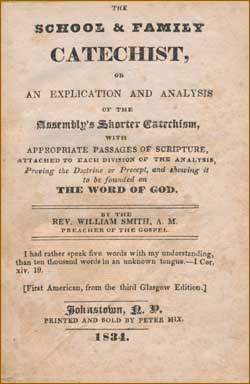 THE SCHOOL & FAMILY CATECHIST
THE SCHOOL & FAMILY CATECHIST
by Rev. William Smith (1834)
The Westminster Shorter Catechism, Questions 79 & 80.
Q. 79. Which is the tenth commandment?
A. The tenth commandment is, “Thou shalt not covet thy neighbor’s house, thou shalt not covet thy neighbor’s wife, nor his man-servant, nor his maid-servant, nor his ox, nor his ass, nor any thing that is thy neighbor’s,” Ex. xx. 17.
EXPLICATION.
Thou shalt not covet. –Thou shalt not desire, nor wish to have, or to possess, in any sinful or improper manner.
Q. 80. What is required in the tenth commandment?
A. The tenth commandment requireth full contentment with our own condition, with a right and charitable frame of spirit towards our neighbor, and all that is his.
EXPLICATION.
Full contentment. –Being satisfied, or having a quiet and easy temper of mind, in the station in which God has placed us.
A right and charitable frame of spirit. –A kind and compassionate disposition, or having a mind which can rejoice in our neighbor’s welfare, and be grieved for his afflictions, as if they were our own.
ANALYSIS.
The duties required in the tenth commandment are two-fold:
- Full contentment with our own condition. –Heb. xiii. 5. Let your conversation be without covetousness, and be content with such things as ye have.
- A right and charitable frame of spirit toward our neighbor, and all that is his. –Rom. xii. 15. Rejoice with them that do rejoice, and weep with them that weep. 1 Cor. xiii. 4, 5, 6. Charity suffereth long, and is kind; charity envieth not, charity vaunteth not itself, is not puffed up, doth not behave itself unseemly, seeketh not her own, is not easily provoked, thinketh no evil, rejoiceth not in iniquity, but rejoiceth in the truth.
